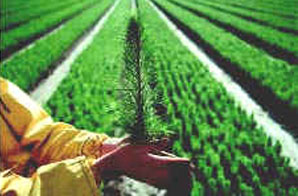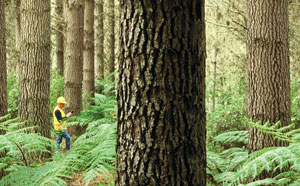Forestry Scientist
Tasks & duties

Forestry scientists may do some or all of the following:
-
measure and analyse tree and forest growth
-
investigate new species of trees that may be of commercial interest
-
develop methods to breed tree species
-
develop new ways of producing timber products
-
study the forest soil
-
study damage to trees caused by diseases or animals
-
investigate the impact of forestry on communities, and the impact of communities on forests
-
investigate the productivity of processing plants
-
study the transport of forest products
-
study export markets for wood and paper
-
supervise technical and research staff
-
interact with the forestry industry to develop new technology
-
provide technical advice about forestry matters
-
write and publish reports on research findings
At the technician level, the main tasks are to help scientists prepare and carry out a range of experiments and tests.
Specialisations
Forestry scientists may specialise in an area of forestry sciences such as biotechnology, forest technology, pulp and paper, wood processing or wood quality.
Skills & knowledge

Forestry scientists need to have:
-
knowledge of environmental issues
-
up-to-date knowledge of the latest forestry research and equipment
-
research skills
-
skill in analysing and interpreting research results and other information
-
practical skills for performing experiments and operating scientific equipment
-
problem-solving skills
-
planning and organisational skills
-
communication skills
-
writing skills, for writing reports and publications
-
maths and computer skills
Entry requirements
To become a forestry scientist you need to have a degree in forestry science or engineering, or a related course such as molecular biology, botany or plant physiology.
Postgraduate qualifications are increasingly preferred by employers.
At the technician level, a Bachelor’s degree in a related science subject is the minimum entry requirement.
Secondary education
A tertiary entrance qualification is required to enter further study. Maths, English, computer studies and science subjects are preferred.
Training on the job
Although many skills are learned at university, further laboratory and experimental skills are gained on the job. Forestry scientists may also attend conferences and seminars. Some employers sponsor scientists to go on professional development courses relating to forestry. Technicians often do postgraduate studies alongside their work. They are also mentored by scientists to help them gain practical skills for carrying out specific experiments.
Useful experience
Useful experience for forestry scientists includes summer placements working as a technician while studying for a Master's degree. Working as a volunteer in ecology and conservation is also useful. Experience driving four-wheel-drive and all-terrain vehicles may be useful when in the field.
Related courses
Biochemistry and Cell Biology
Botany
Ecology and Evolution
Forestry Studies
Horticulture
Document Actions
